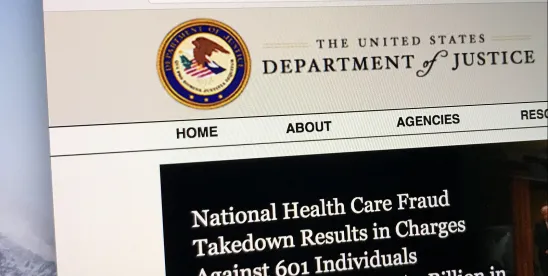The U.S. Department of Justice (“DOJ”) recently announced the creation of the Health Care Monopolies and Collusion Task Force (the “HCMC Task Force”) aimed at resolving antitrust issues in the health care industry. Specifically, the HCMC Task Force will focus on investigating issues related to the quality of patient care, consolidations between health care entities, labor and employment, and access and misuse of data. It will further promote DOJ’s public policy relating to the need for and benefits of preserving competition in health care. The HCMC Task Force’s mandate is broad and extends to scrutiny, not only of direct health care service providers, but also of companies that work with health care data and health care technology.
The HCMC Task Force will bring together health care experts, accountants, investigators, civil and criminal prosecutors, economists, data scientists, and policy advisors from across DOJ’s Antitrust Division to identify and address antitrust issues in health care markets. In the announcement, the Deputy Director of Civil Enforcement for DOJ’s Antitrust Division, Katrina Rouse, stated: “The task force will identify and root out monopolies and collusive practices that increase costs, decrease quality and create single points of failure in the health care industry.” The Secretary of the U.S. Department of Health and Human Services (“HHS”), Xavier Becerra, agreed, reminding the public that “[c]ompetition helps ensure patients have access to high-quality, lower cost care, and that health care workers receive higher pay and work under better conditions … and saves taxpayers money.”
The formation of the HCMC Task Force comes on the heels of the launch of HealthyCompetition.gov, an online public portal to report antitrust violations to DOJ, HHS, and the Federal Trade Commission (“FTC”). This public portal allows businesses and individuals to alert DOJ and the FTC about such anticompetitive behaviors, including, for example, alleged instances of illegal roll-ups, price-gouging, and collusion amongst competitors. Information received by DOJ and FTC may then provide a basis for investigation.
Additionally, this past March, DOJ, HHS, and the FTC launched a cross-government inquiry into the observed increasing control by private equity of the health care industry. The agencies have been collectively examining the effect of private equity’s involvement on patient outcomes, prices, employee benefits and wages, and innovation in health care. FTC Chair Lina Khan stated that, “[t]hrough this inquiry the FTC will continue scrutinizing private equity roll-ups, strip-and-flip tactics, and other financial plays that can enrich executives but leave the American public worse off.” The agencies issued a Request for Information seeking comments on transactions between health systems, insurers, facilities, and private equity funds. The comment period, which closed on May 6, resulted in more than 1,600 public comments. Proskauer has the knowledge, experience, and expertise to help health care stakeholders understand and navigate the implications of the law and the enforcement priorities of regulators in this era of increased scrutiny.





 />i
/>i

